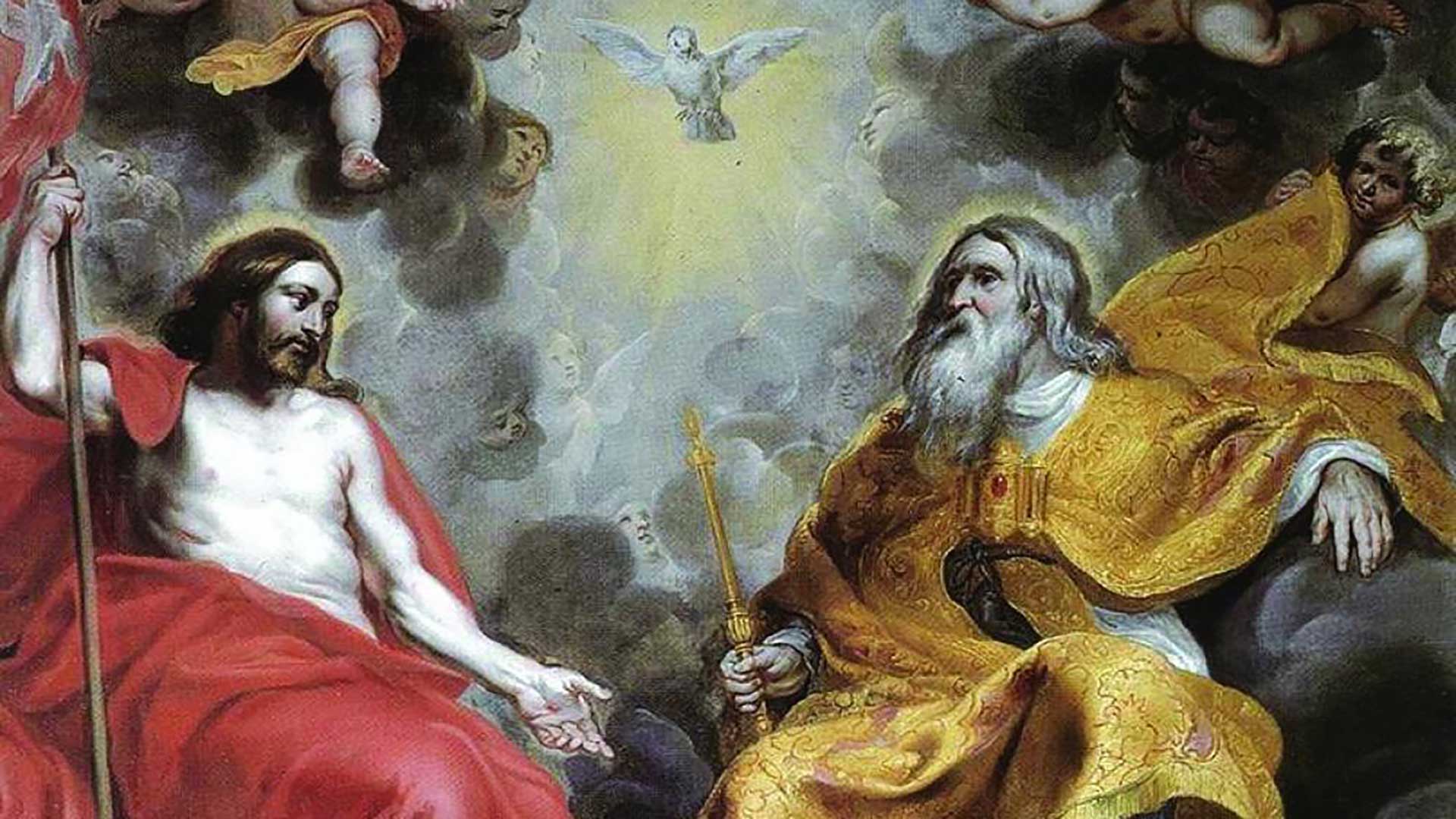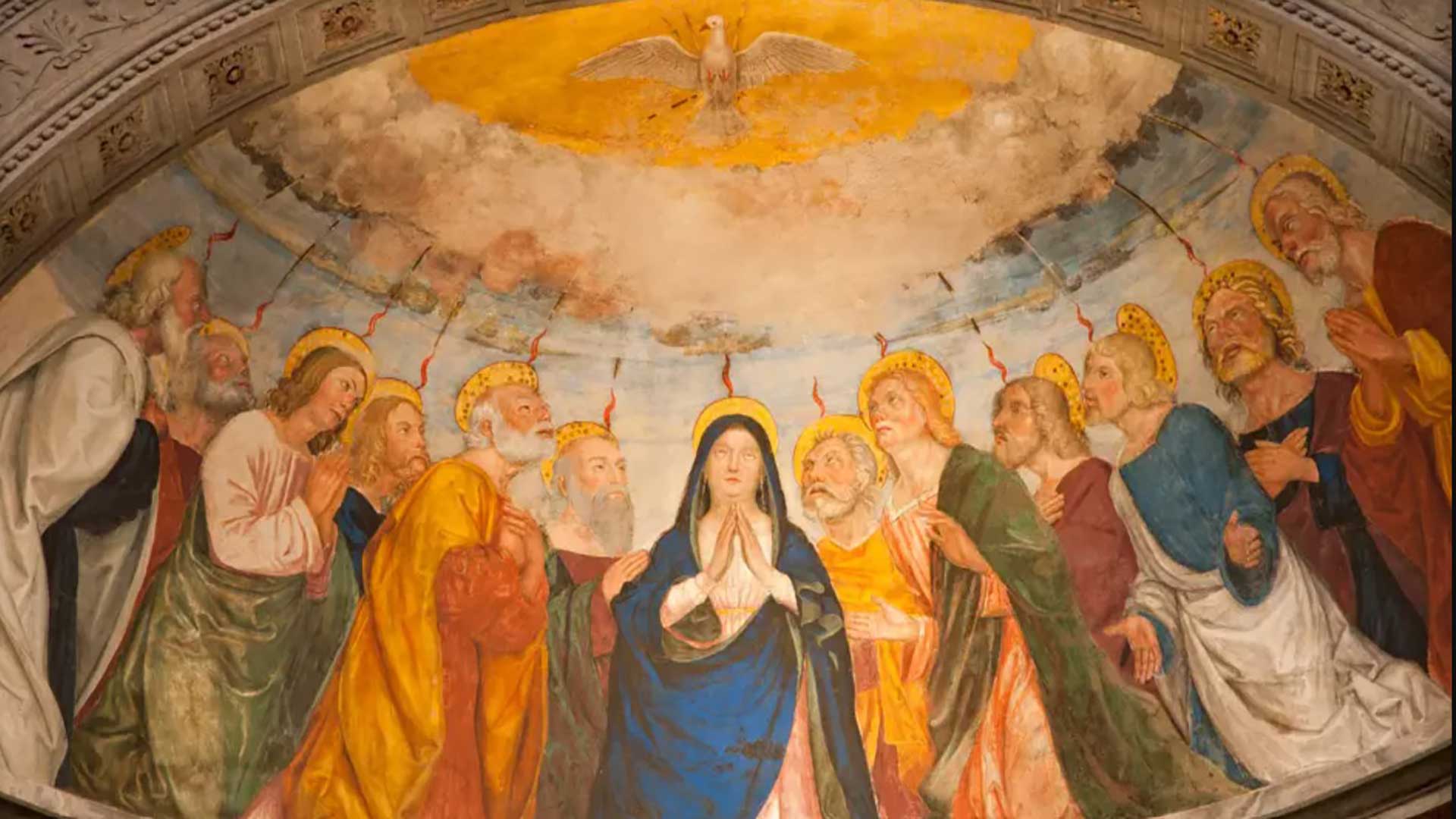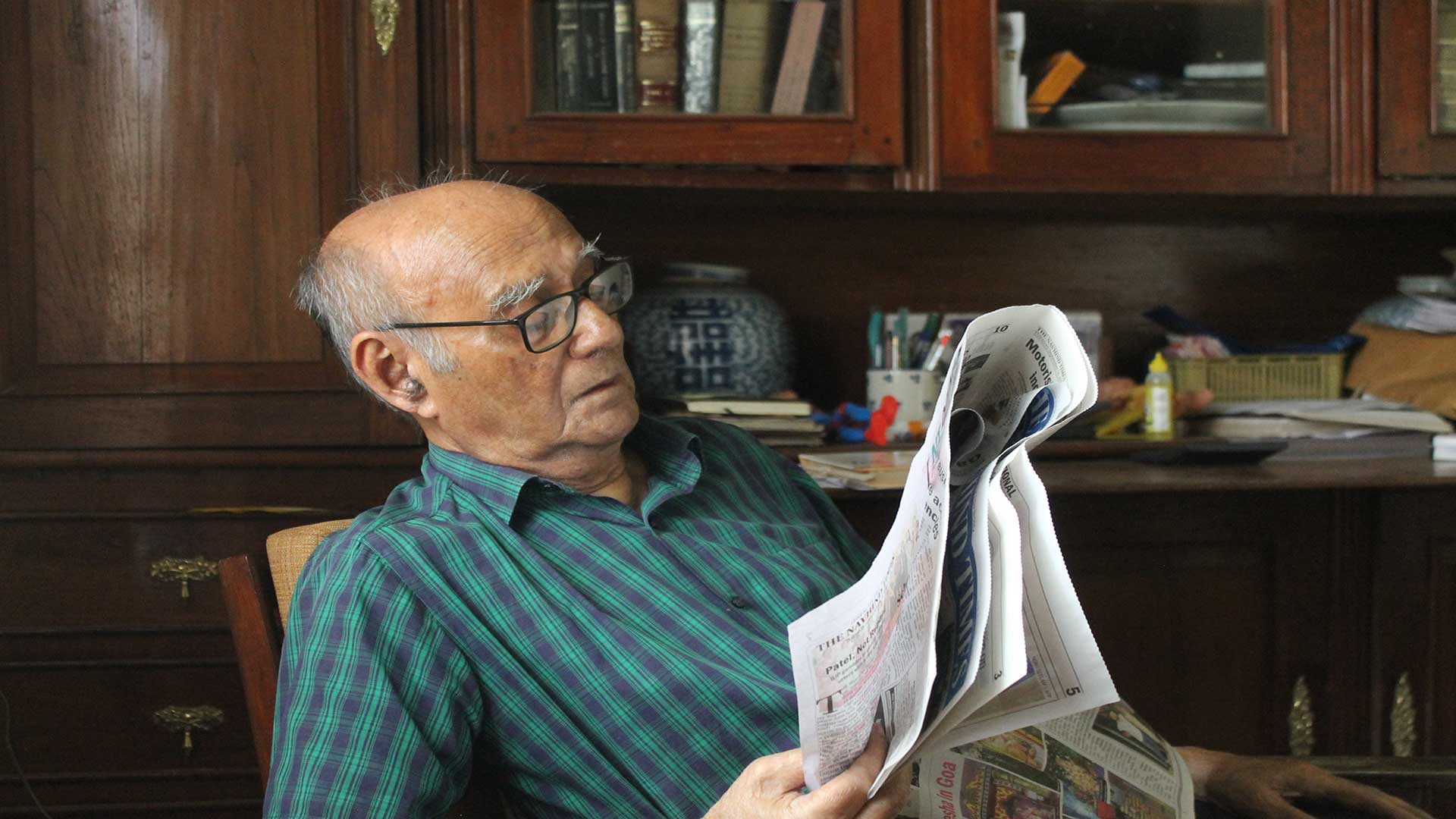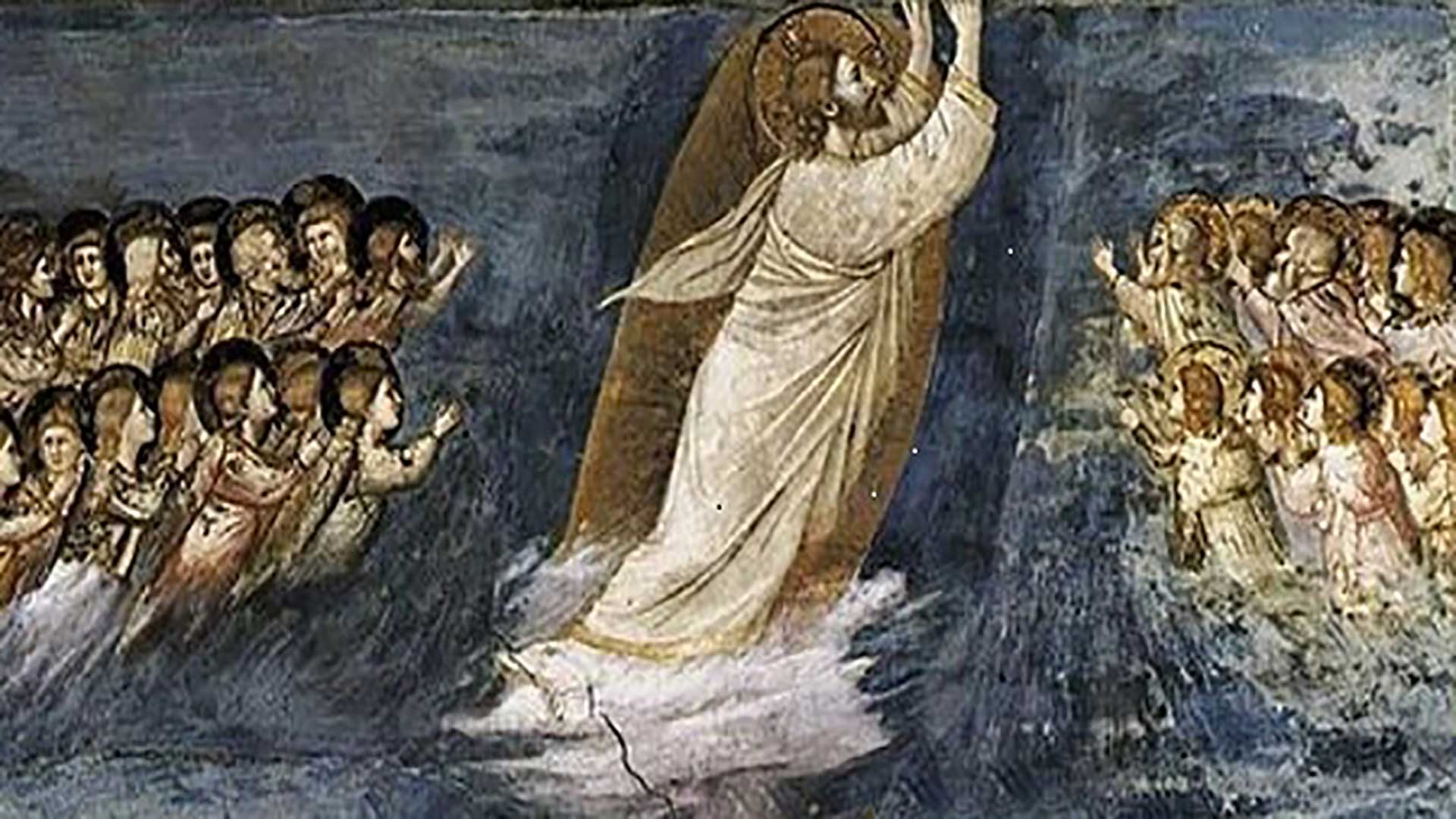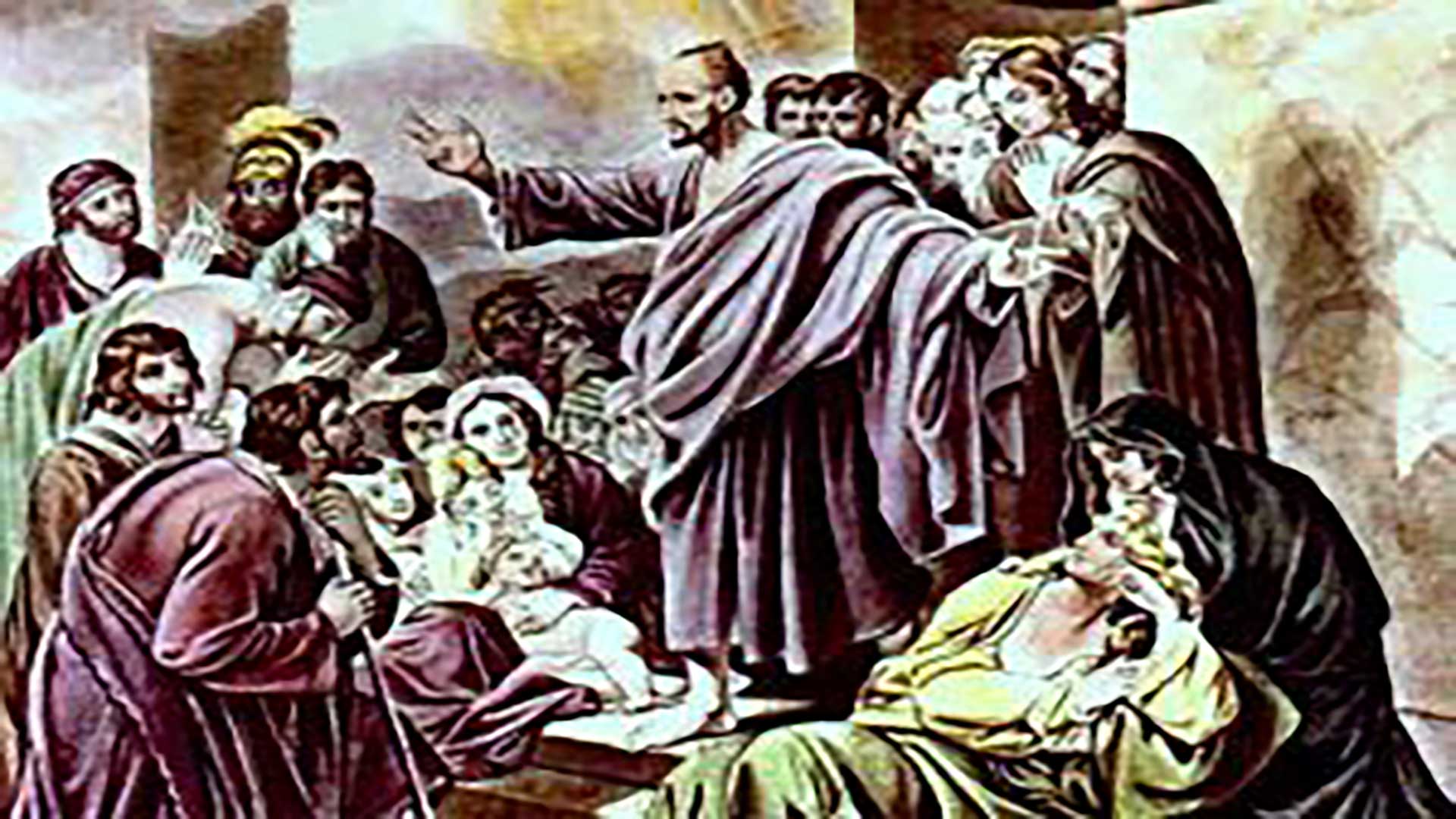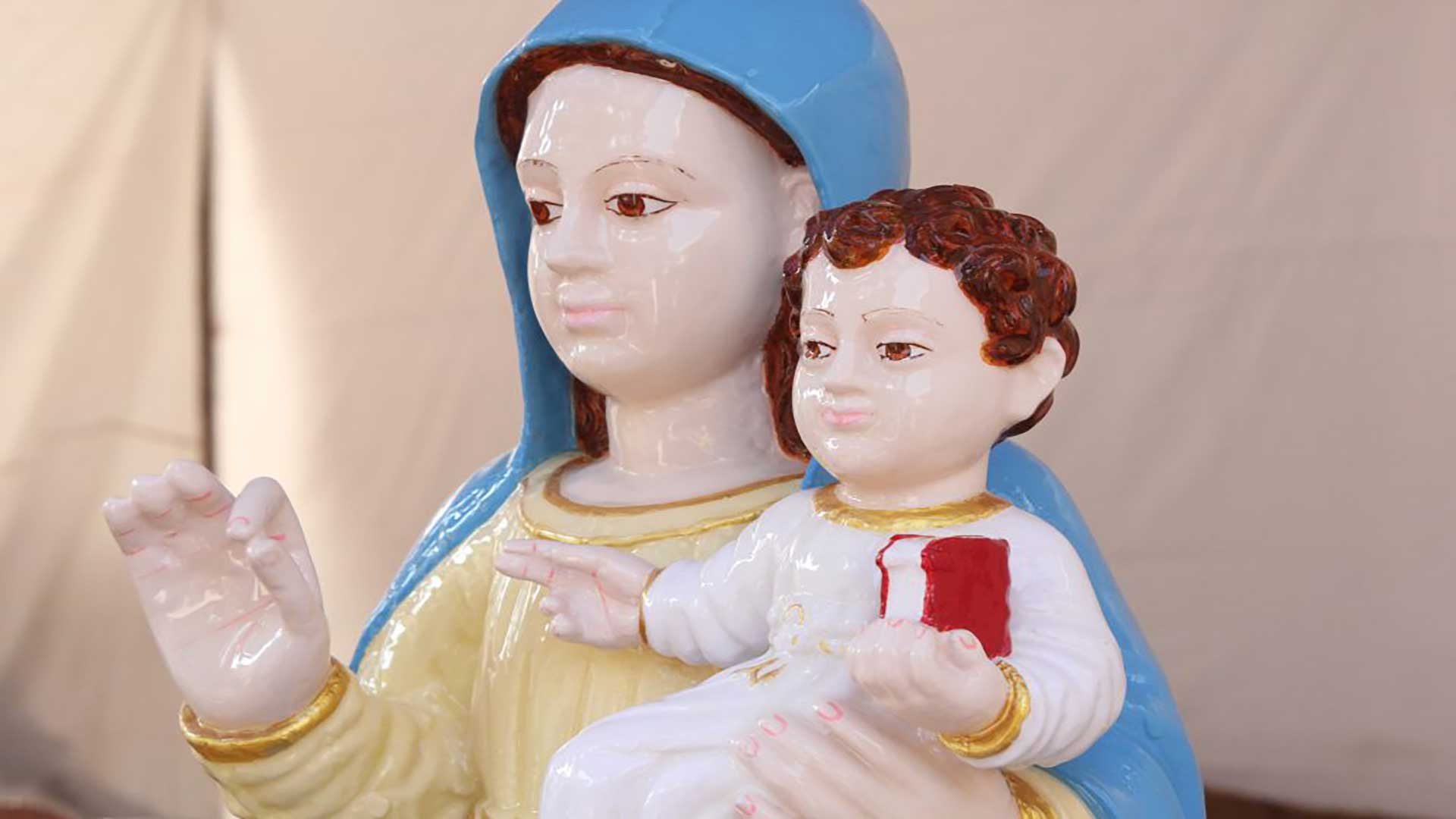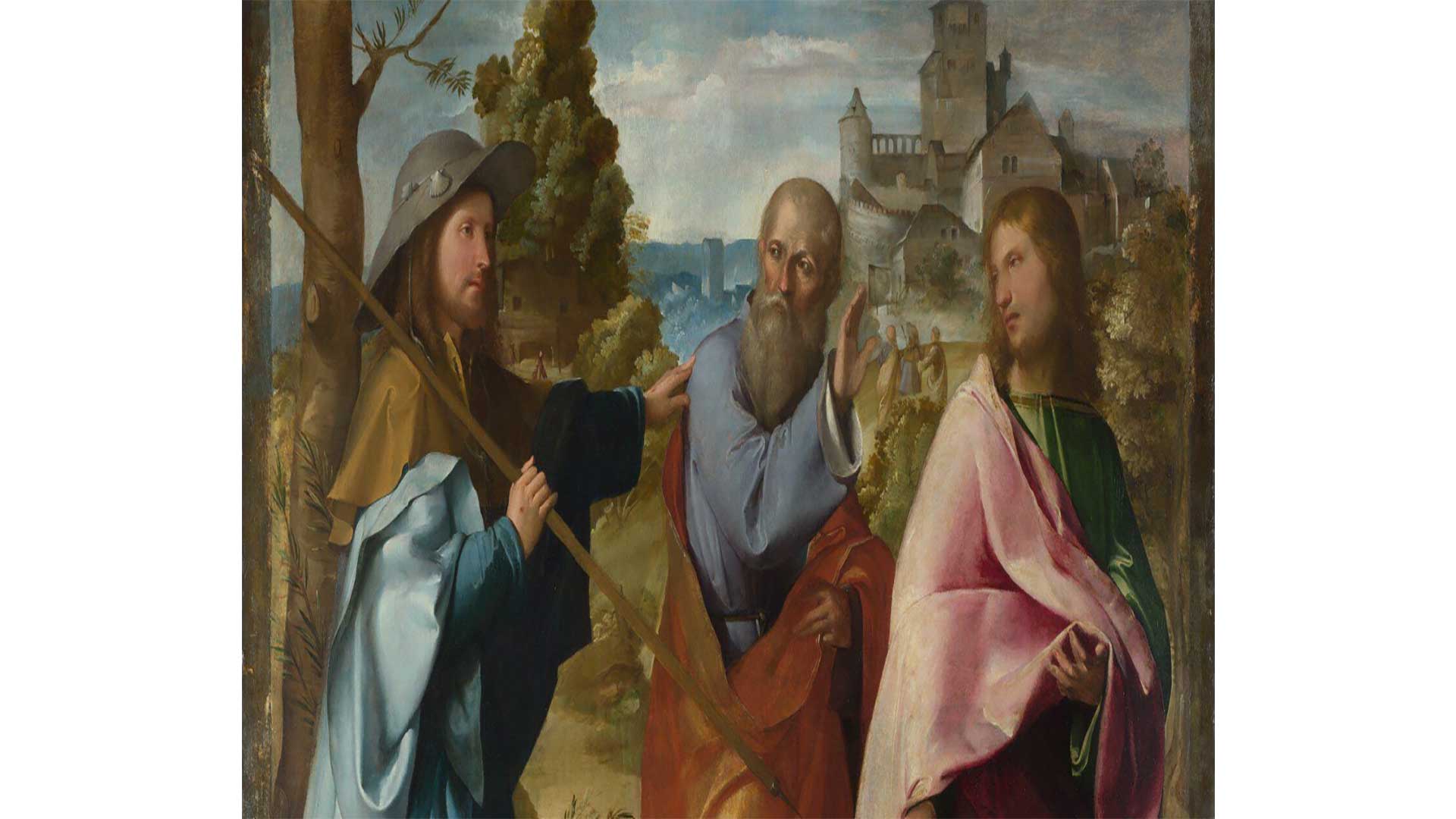The Holy Trinity, a deep Mystery!
Close on the heels of Sunday of the Holy Spirit comes Sunday of the Holy Trinity, this latter being the central mystery of our faith and life (CCC 234). We believe in One God, who is not alone, solitary, but a Trinity, a Triune God, a divine family of life and love. As the Father sent His Only Son, the Second Person of the Holy Trinity, Jesus Christ, to be born in the world; and, in turn, Jesus Christ, who upon ascending to the Father, made sure that the Third Person, the Holy Spirit, would descend upon the world, it is but natural that we acclaim them all together today – in the Solemnity of the Holy Trinity.
The First Reading (Exod 34: 4-6, 8-9) takes us back to the beginning, to witness Moses’ encounter with God the Father. God rightly introduces Himself as “merciful and gracious, slow to anger, and abounding in steadfast love and faithfulness.” This delightfully accurate self-description so comforts Moses that he promptly invokes his “stiff-necked people” (a true description of the miserable human race) who, by relapsing into idol worship, had provoked Moses into breaking the tablets inscribed with the Decalogue. Moses calls upon God to pardon their iniquity and their sin, and take them for His inheritance, or say, forgive their shortcomings, restore them to health and become beneficiaries of His love.
The Gospel (Jn 3: 16-18) refers to the Second Person, in the words of none other than Jesus Himself: “God so loved world that He gave His Only Son, that whoever believes in Him should not perish but have eternal life.” Here we have an endorsement of God’s love and the promise of eternal life to those who believe in Him. In the words of bishop St Cyprian of Carthage (3rd century AD), salus extra ecclesiam non est, or extra Ecclesiam nulla salus, which means that outside the Church there is no salvation.
So, what about “he who does not believe”, as Jesus put it? God’s love expressed through Jesus – who died to save us – is so great that we lose our salvation if we do not stand by Him and embrace the Faith. This is what the Catholic Church has traditionally taught. The present Catechism of the Catholic Church, quoting Vatican II document Lumen Gentium, explains: “Those who, through no fault of their own, do not know the Gospel of Christ or his Church, but who nevertheless seek God with a sincere heart, and, moved by grace, try in their actions to do his will as they know it through the dictates of their conscience – those too may achieve eternal salvation.” (CCC 847) Food for thought and discussion beyond the Reading of the day!

The Second Reading (2 Cor 13: 11-13) speaks of the Holy Spirit. St Paul teaches us to greet one another saying, “The grace of the Lord Jesus Christ and the love of God and the fellowship of the Holy Spirit be with you all.” Familiar words. That’s how the Apostle of the Gentiles ends his letter to the Corinthians; and that’s how we begin the liturgy of the Holy Sacrifice of the Mass. So routinely do we pronounce these words that we fail to appreciate their deep meaning.
The fact is that none can claim to have fully understood the Holy Trinity. But, as the Catechism says: “God has left traces of his Trinitarian being in his work of creation and in his Revelation throughout the Old Testament. But his inmost Being as Holy Trinity is a mystery that is inaccessible to reason alone or even to Israel's faith before the Incarnation of God's Son and the sending of the Holy Spirit (CCC 237). The Father is revealed by the Son; the two are revealed by the Spirit (CCC 238-248) The whole divine economy is the common work of the three divine persons. (CCC 258) The ultimate end of the whole divine economy is the entry of God's creatures into the perfect unity of the Blessed Trinity. (CCC 260)
So, how do we proceed from here? Even before trying to delve into the Mystery, we must acknowledge how privileged we are as Christians to have been let into what is indeed the Mystery of the intimate life of God. It is profound, simply overwhelming, incomparable! If we have not fully understood it – and we never will – there is nothing to fear. St Augustine tried to reason out, but to no avail; there is that famous story of how a little child set his questions at rest…. So, out of the mouths of babes...!
On the other hand, what the mind cannot do, our hearts can – faith can! How does a mother understand her baby who only babbles? She does it with love. And that is how, even with reference to everyday things, we may understand the working of the Trinity, "God has left traces of his Trinitarian being in his work of creation". One popularly quoted instance is the flame of fire, which has three attributes (heat, light and shape) and yet is one; and can never be a flame of fire if one of them is missing! The same trinitarian spirit must inspire our domestic life.
Today provides us with an opportunity to meditate upon this fundamental Mystery of our faith and love and to initiate a personal relationship with each of the three Persons of the Holy Trinity!
Pentecost and Proclamation
Today, the eighth Sunday of Easter, we celebrate Pentecost, or say, the fiftieth day after Easter. It marks the descent of the Holy Spirit upon the disciples. The intimate connection between the two feasts will be lost on us if we do not look at its pre-Christian background.
In the old Jewish tradition, the feast of Shavuot was the fiftieth day after the Pesach (Passover). This was held to commemorate the liberation of the Jews from slavery in Egypt. On this occasion, many Jews from countries around the Mediterranean came on pilgrimage and stayed on till the Shavuot. This was at first an agricultural feast (a thanksgiving for the first fruits of the wheat harvest) but later came to be related to the receiving of the Law by Moses on Mount Sinai.
On the other hand, a new tradition began when the Resurrection coincided with the day of the Passover. In fact, the Resurrection replaced the Passover, for precisely by His death and resurrection, Jesus offered the world freedom from death and sin. Similarly, fifty days later, or say, coinciding with Shavuot, Jesus sent down the Holy Spirit upon His disciples. Thus was Shavuot Christianised and called Pentecost, Greek for ‘fiftieth day’.
So much for the relation between the old and the new.
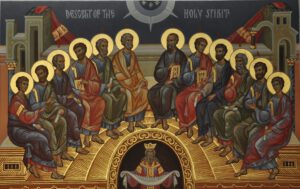
In the first Reading (Acts 2: 1-11), St Luke describes the marvel of Pentecost. The disciples and others were gathered to celebrate Shavuot when there was a rush of a mighty wind and tongues as of fire came to rest on each of them. While the wind represents the breath of God blown into the disciples, the fire represents the courage and enthusiasm that filled the disciples.
Concretely speaking, the Pentecost represents the foundation day of the Church. On this day, Jesus sent down the Holy Spirit to guide and inspire the disciples on their mission to preach the Gospel, just as He had promised them before he ascended to the Father. “As the Father has sent me, even so I send you,” says the Gospel (Jn 20: 19-23; a longer form of which was read on the Second Sunday of Easter).
To effectively carry out missionary work, each member of the community received (and still receives) one or more gifts and charisms. There are seven gifts of the Holy Spirit: wisdom, understanding, counsel, fortitude, knowledge, piety, and fear of the Lord. Whereas gifts are “permanent dispositions which make man docile in following the promptings of the Holy Spirit” (CCC 1830) given primarily for the purpose of personal sanctification, charisms (e. g. healing) are special gifts given for the common good, or say, the good of the Church (cf. CCC 798 ff).
. Significantly, on the Birthday of the Church, there were people separated by languages, cultures, races and nations (all symbolised by the expatriate Jews present over there): they now formed the new People of God.
So, how important, really, is the Holy Spirit? St Paul, in the Second Reading (1 Cor 12: 3-7, 12-13) says that “no one can say ‘Jesus is Lord’ except by the Holy Spirit”. It is the same Spirit that fills us with charisms, and lets us serve, each according to our gift. While the charisms and services are varied, it is the same Lord. “To each is given the manifestation of the Spirit for the common good.” Which implies that our life must be dedicated to the Truth that is God and to the service of the community.
This community is fundamentally the Church. Jesus is the tree or the body, and, correspondingly, we are the branches or the members. The Holy Spirit keeps us united and drinking of the same belief in the True God.
Can there be any doubt, then, that the Church is a divine rather than a human institution? The Holy Spirit gives it life. The same baptism of fire that the apostles received we too do receive through the Sacrament of Confirmation. The gift of tongues symbolises the fact that the Church goes out to the peoples of the world and adapts to their culture while doing what she has been called to do: most clearly proclaiming Our Lord Jesus Christ and Him alone. That is how intimately the proclamation of the Gospel is related to the Pentecost.
A hymn for Pentecost: https://youtu.be/5GrQJGQWfd8
A Gentleman Judge turns 90
The uproar about who will judge the judge is never about the Judge-with-a-heart. Wouldn’t the world be a poorer place without judges to hear disputes and settle people’s differences? The rhetoric, therefore, is aimed at judges who are unfair, whereas judicial officers who have performed their duties to a tee ought to have our gratitude and praise.
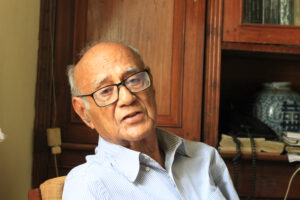
Goa’s judicial system has produced many distinguished judges. Álvaro de Noronha Ferreira, who turns 90 today, is a more recent addition to the roll of honour. After graduating from the Panjim Lyceum, he secured a licentiate in Law, with a specialisation in Political and Economic Sciences, from the historic University of Coimbra. He returned to Goa, in 1957, to serve his land, and did so with distinction, retiring as District and Sessions Judge, in 1993.

The political transition of 1961 impacted the careers of entrants into the judicature. Not only did they have to quickly adapt to a dual (civil and common) law system; for the administration of justice in the initial years, they had to even grapple with dual languages (Portuguese and English). Nonetheless, Dr Noronha Ferreira, or simply, Dr Ferreira, as he is referred to by the older and younger generations of the legal community, respectively, discharged his functions with independence, impartiality, integrity, propriety, equality, competence and diligence (cf. Bangalore Principles of Judicial Conduct, 2002) – to the satisfaction of litigants, lawyers and the general public.

In a book titled In Black and White, brought out on the occasion of Dr Ferreira’s 80th birthday, lawyers and judges have narrated stories illustrating Dr Ferreira’s qualities of head and heart: his knowledge, realism, poise, and sense of humour. Humility is yet another of his widely recognised virtues. It is on record that, on delivering judgements in open court, he would candidly say to the advocate of the losing side: “Mr X, I am not convinced of your client’s case; if you think I am wrong, do file an appeal.”
That is to say, Dr Ferreira did not pretend to be a know-all; he put the lawyers at ease and conducted proceedings with cordiality and dignity; and the litigants for their part found in his polite, baritone voice a promise of justice delivered without fear or favour. It brought positivity to the courtroom and credibility to the judicial process.

So much for Dr Ferreira’s public persona. Is he any different in his personal capacity? I can say that he is one and the same person – married to the truth! His wife, Satya Costa, who quit her job as an assistant professor of Chemistry at the University of Lisbon, has stood solidly behind him; “clothed with strength and dignity… she speaks with wisdom, and faithful instruction is on her tongue” (Prov. 31:10) Their children, Filipe, a PhD in robotics; Carlos, a gastroenterologist in Lisbon; Teresa, a neurologist with the Goa Medical College; and Jorge, a lawyer practising in the capital city, together with their families, carry on the Noronha Ferreira legacy of truth and public service.
Until his retirement, Dr Ferreira’s other interests, like history, economics, numismatics, music, horticulture, were on the back burner. Thankfully, he has remained an avid reader and engaging conversationalist. Blessed with a fund of anecdotes and a memory for detail, he is a colourful raconteur among family and friends. He is discreet by nature and training but does not fail to call a spade a spade, for instance, when it comes to a point about Goan history or in defence of the common good. A stickler for punctuality, he is always ready to go.
Dr Ferreira comes across as one who has internalised the verum, bonum, pulchrum and, by grasping the mysteries of the human heart, has refined the act of judging. His remarkable resilience springs from his innate trust in Divine Providence in all situations of life. By his rich experience of law and life, he carried out his post-retirement assignment as chairman of the Goa Public Service Commission, with wisdom. He has helped with the Lok Adalat, arbitration proceedings, settlement of disputes through conciliation, and gave legal advice to all and sundry who approached him.
Dr Ferreira is a role model for the ages. Thanks to the benchmarks he has set, members of the legal fraternity encourage one another to “be like Dr Ferreira!” A gentleman judge like him is for ever.
Photo credits: Carlos Noronha Ferreira
Ascension: Heaven and Earth drawn near
Even just the last two mysteries of the life of Jesus – the Resurrection and the Ascension – are sufficient to convince us that Jesus is God. The Resurrection shows that Jesus not only rose from the dead but also never died again. In his new, glorified body, Jesus revealed Himself at many locations, over a significant forty-day period. Now, before the apostles’ very eyes, He ascended to His Father, and has been there ever since.
The two mysteries are not only embedded in Scripture, they are recognised by several non-Christian historical sources as well. Even some writers hostile to Christianity attested to the historicity of Jesus and the Resurrection, among them, Stoic philosopher Mara (c. 73 AD) in a letter to his son Sarapion; the Greek-writing Jewish priest Flavius Josephus in his book Jewish Antiquities (c. 93 AD), the influential Roman historian and senator Tacitus in his Annals (c. 116 AD); another Roman historian, Suetonius, in his Lives of the Twelve Caesars (c. 121 AD); and the Talmud (c. 400 AD), a collection of ancient Jewish laws.
If about the Ascension, there seems to be only Scriptural testimony, it is possibly because the eleven apostles alone were privy to the marvel. St Matthew (28: 16-20) and the Acts of the Apostles (1: 1-11) – both of which form the Gospel and the First Reading of today; St Mark (16: 15-20) and St Luke (24: 46-53) (earmarked for Years B and C of the liturgical year) talk about the Ascension. Curiously, the Old Testament too refers to the Ascension, in Psalm 68: 18, a reference that St Paul has used to great effect. In the Second Reading today, we read a passage from his letter to the Ephesians (1: 17-23).
Here is how The Catholic Encyclopaedia describes the glorious Ascension: “Although the place of the Ascension is not distinctly stated, it would appear from the Acts that it was Mount Olivet, since after the Ascension the disciples are described as returning to Jerusalem from the mount that is called Olivet, which is near Jerusalem, within a Sabbath day’s journey. Tradition has consecrated this site as the Mount of Ascension and Christian piety has memorialized the event by erecting over the site a basilica. St Helena built the first memorial, which was destroyed by the Persians in 614, rebuilt in the eighth century, to be destroyed again, but rebuilt a second time by the crusaders. This the Moslems also destroyed, leaving only the octagonal structure which encloses the stone said to bear the imprint of the feet of Christ, that is now used as an oratory.
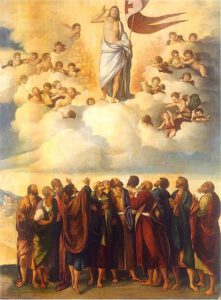
“Not only is the fact of the Ascension related in the passages of Scripture cited above, but it is also elsewhere predicted and spoken of as an established fact. Thus, in John 6: 63 Christ asks the Jews: ‘If then you shall see the Son of Man ascend up where He was before?’ and in 20: 17, He says to Mary Magdalen: ‘Do not touch Me, for I am not yet ascended to My Father, but go to My brethren, and say to them: I ascend to My Father and to your Father, to My God and to your God.’ Again, in Ephesians 4: 8-10, and in Timothy 3: 16, the Ascension of Christ is spoken of as an accepted fact.
“The language used by the Evangelists to describe the Ascension must be interpreted according to usage. To say that He was taken up or that He ascended, does not necessarily imply that they locate heaven directly above the earth; no more than the words ‘sitteth on the right hand of God’ mean that this is His actual posture. In disappearing from their view ‘He was raised up and a cloud received Him out of their sight’ (Acts 1: 9), and entering into glory He dwells with the Father in the honour and power denoted by the Scripture phrase.”
To positivists and rationalists who may mock the doctrine of the Ascension, the all-important twentieth-century author of Miracles , C. S. Lewis, states interestingly that after the Resurrection, it may have been that Jesus, “a being still in some mode, though not our mode, corporeal, withdrew at His own will from the Nature presented by our three dimensions and five senses, not necessarily into the non-sensuous and undimensioned but possibly into, or through, a world or worlds or super-sense and super-space. And He might choose to do it gradually. Who on earth knows what the spectators might see? If they say they saw a momentary movement along the vertical plane – then an indistinct mass – then nothing, who is to pronounce this improbable?”
In the universality of its observance, the Ascension ranks with Christmas, Easter, and the forthcoming Pentecost. The Ascension completes a glorious cycle which began with the Incarnation; so, it makes perfect sense that Jesus who deigned to come into the world should, at the end of his mission of reconciling man to God, return to the bosom of the Father. His momentous last words on the occasion bear this out. For our part, we must bear Him witness throughout our pilgrim journey on earth, also gratefully acknowledging that, through His Ascension, Heaven and Earth have drawn near.
Banner: https://rb.gy/bahmj
Pondering God’s commandments, with love
As we inch towards the Ascension and Pentecost, we see heartening changes in the incipient Christian community. In the First Reading (Acts 8: 5-8, 14-17), we meet Philip, one of the seven deacons. He is presently in Samaria, where his preaching fell on good soil. The people were in awe of his words and miracles, and relieved on being delivered of evil spirits. On hearing that encouraging update in Jerusalem, apostles Peter and John were dispatched double quick to lay their hands over the Samaritans and pray that they too receive the Holy Spirit.
Samaria awaited a Messiah but was traditionally considered idolatrous ever since a temple to Baal was erected there by King Ahab. So, why was the region suddenly privileged to be in the forefront of evangelisation? Philip had ventured there because Jesus Himself had preached in the area (cf. the story of the Samaritan woman at the well) and wished that the Gospel be taken there after His ascension. Thus, Jesus implied that the Good News of Salvation was meant to reach one and all. It is doubly significant that Philip, not an apostle but a deacon, whose main job was to relieve the apostles of menial chores, became the first foreign missionary in Christian history.[1]
The act of reaching out to Samaria has since had far-reaching implications. The church in Samaria was to Jerusalem what a local church today (say, the archdiocese of Goa and Daman) is to the universal church. The arrangement throws light on the very meaningful hierarchical structure that has governed the Church for the last two millennia; it speaks volumes for the issuance and teaching of doctrine centrally, from the headquarters in Rome, so that all of Christendom is of one mind; and finally, it points to the communion of saints, or say, the fellowship of those united with Christ across space and time.[2]
For Christ to be present with His people across space and time is no mean feat; but to God nothing is impossible. It is a fulfilment of what Our Lord had promised in his farewell discourse, just before His Passion and Death. He had said that after His Ascension, the Holy Spirit would be with the Christians till the end of times; the Spirit of truth would pick up from where He had left off, to illumine and strengthen all the faithful. There is no denying that, inasmuch as we keep the commandments, we grow in wisdom and stature, and live in spiritual unity and love of God. God is then always in our midst.

But, really speaking, who has the strength to keep the Lord’s commandments? Only those who love Him will do so, says Jesus, quite plainly, in the Gospel today (Jn 14: 15-21). Yes, it demands total commitment – difficult, but not unreasonable or impossible. Don’t spouses, children, bosses, friends, clubs, expect the same? Don’t we, then, respect rules and keep promises; and when we don’t, we quit – or are obliged to quit? Why, then, should a relationship with the divine be any different? In fact, our commitment should have been infinitely stronger; but alas, it isn’t, simply because for far too long we have been accustomed to taking God for granted. ‘God will understand’ is a lame explanation, and a convenient ruse to flout rules and break promises.
Concretely, let us look at the First Commandment: "You shall worship the Lord your God and Him only shall you serve." It summons us to believe in God, to hope in Him, and to love Him above all else. "You shall love the Lord your God with all your heart, and with all your soul and with all your strength" (Deut. 6:5). Adoring Him, praying to Him, offering Him the worship that belongs to Him, fulfilling the promises and vows made to Him are acts of the virtue of religion.
On the other hand, superstition is a departure from the worship that we give to the true God. It is manifested in idolatry, as well as in various forms of divination and magic. Similarly, atheism is a sin against the first commandment, since it rejects or denies the existence of God.[3] Yet, what is the in-thing? To keep God out of one’s day-to-day dealings, if deemed socially and/or politically expedient. This is the antithesis of the First Commandment that we are expected to profess and practise; what the score will be on the remaining nine is anybody’s guess!
St Peter in the Second Reading (1 Pet 3: 15-18) therefore counsels us to revere Christ as Lord; defend those who are on God’s side; do the right thing, in the right way, so that none can point an accusing finger at us. “For it is better to suffer doing right, if that should be God’s will, than for doing wrong,” he adds. We ought to muster courage by summoning up the memory of Our Lord’s undeserved death for our sins. As regards us, we run the risk of being hated or even put to death for siding with God, but we may rest assured that we will be made alive in the spirit by the same God who has conquered sin and death: Jesus Christ our Lord.
A tall order? If we listen to God’s commandments – with our minds and hearts – pondering what they mean to us here and now, we will invariably be assisted by the Holy Spirit. As Jesus has cautioned, the dark world of unbelief is incapable of understanding and accepting the Spirit of truth – which will be accessible only to those who love and revere Him!
[1] Philip famously converted an Ethiopian eunuch, thus inducting a black into the church at a very early stage. Then he proceeded to evangelise other areas up to Caesarea; Greece, Syria and Phrygia.
[2] Those living are said to constitute “the church militant”, while the dead who are in Heaven, “the church triumphant”, and those in Purgatory, “the church suffering”. Yet the three groups are in communion of the Spirit.
[3] Cf. Catechism of the Catholic Church, https://www.vatican.va/archive/ENG0015/__P7G.HTM
With eyes of faith
It must have been exciting to be part of the early church. Yet, look how there was disagreement and discrimination at its very inception (Acts 6: 1-7). The Hellenists, Greek-speaking Jews who had returned from the Diaspora, felt discriminated against by the Hebrews, who were local, Aramaic-speaking Jews. Fortunately, to prevent mundane concerns from sapping their energy (in this case, Hellenic widows receiving second-class treatment in food distribution), the Apostles appointed seven helpers or deacons to take care of those worries. Of course, these seven were men of faith and filled with the Holy Spirit; while they helped safeguard social cohesion, the Apostles immersed themselves in the work of evangelisation.
Such wise principles have governed the church ever since. To illustrate it with something very familiar to us, the early church in Goa set up Fábricas to look after the temporal affairs of the parish, while the Confrarias or brotherhoods focussed on spiritual matters. It is not that Fábrica members were worldly-wise and only the confrades holy; faith and morality were essential to membership of either association. But, all in all, the arrangement brought balance to the individual and the community…. Have we strayed from those guiding principles, and consequently, are those bodies now a far cry from what they were meant to be?
Not those bodies alone – but our own bodies and souls are in need of d-e-l-i-v-e-r-a-n-c-e – deliverance – prayer to bring healing and wholeness to us who are struggling with bondage to sin and demonic influences. Haven’t many of us Christians – and, sadly, some of our leaders too – rejected the living stone that in God’s sight is “chosen and precious”? That living stone is Jesus Christ, the Son of God. In the world today, and Goa in particular, it is high time we realised our folly and decidedly turned back; before long the rug will be pulled out from under our feet by the very people that we had once blindly trusted. Alas, it will be a mighty fall, which only a mighty exercise in faith can prevent – deliver us from! The recent happenings in Manipur are a case in point; living stones are sought to be smashed and life snuffed out of the living church.[1]

St Peter (1 Pet 2: 4-9) calls us to be living stones and build ourselves into a spiritual temple. Well, one can lead the horse – er, the sheep – to the water but can one make it drink? We have built magnificent houses of God, but how many care to drink deep of the knowledge of God? The first Apostle reiterates that we are “a chosen race, a royal priesthood, a holy nation”, and our bounden duty, to “declare the wonderful deeds of Him who called you out of darkness into His marvellous light”! Once again, for us in Goa, it is important that we open our eyes to the gift of faith that our ancestors have handed down to us; and it is equally a matter of gratefully passing on that faith – in a pristine condition, that is – to the communities around us. Only then can we think of ourselves as ‘living stones’ of the local and the universal Church.
A proper reflection on our first Pope’s enduring call will not only make our (Sun)day, it will have a considerable bearing on our community life for generations to come. In the wake of that tragic update about Goan Catholics straying into forbidden territory,[2] the Gospel today couldn’t be more pertinent. In answer to Thomas, that courageous Apostle who travelled to India, Jesus, in his farewell discourse at the Last Supper, said: “I am the Way, the Truth and the Life”!
How many times do our shepherds have to drum this message into us – seventy times seven? We the flock should not presume that it will always be possible for our shepherds to go in search of their sheep and bring them back to the fold, restore and heal them! Very often we will have to remember these lessons ourselves or learn them from our somudai or community, which have to rise to the occasion in prayer and a spirit of service.
The Gospel passage (14: 1-12) speaks so unambiguously to us that we almost hear Jesus’ say: “Have I been with you so long, and yet you do not know me?” How come we still do not know the Master’s voice? Do we not believe that He is God, that He is in the Father and the Father in Him? Ever since He became Man, He is within our reach. Haven’t we in Goa had Jesus for the past half a millennium and more? What is the use of declaring from the rooftops, “bhavarth amcho nhoi aicho kalcho, punn Sam Fransisk Xavieracho” (Our faith is not of recent origin; it goes back to the days of St Francis Xavier)[3] if we continue to set our eyes on the idols that the Apostle of the Indies had got out of our sight?
Today, let us reaffirm our resolve to follow Him who is the Way, the Truth and the Life. Let us keep the faith; let no other, however exalted his position, destroy it for us by presenting pastures new. As Jesus has twice said in Jn 14, “Let not your hearts be troubled”! And, yes, let us not depend on our physical eyes to see Him; we can see Him with eyes of faith (below, a hymn to help us reinforce it). We ought only to root out misplaced customs and usages, and let the words of Jesus take root in our souls instead.
| Tuka amim polleunk nam (1 Ped 1, 8)
Tuka amim polleunk nam, punn Tujer amcho bhavart, Jezu amchea Taroka! Jezu, sorv utram Tujim sasnnachea jivitachim: konna-xim vochum ani!
Tuka amim polleunk nam, punn Tujer visvas tthevtanv, Jezu, amchea Taroka! Jezu, Tum eklo amkam bhasaitai sasnnik jivit: bhasavnnen pett´ta visvas!
Tuka amim polleunk nam, tori môg Tuzo kortanv, Jezu, amchea Taroka! Jezu, Tum chôdd-chôdd boro sogllo môg Tuka favo: amchem sukh Tujea mogan! |
We have not seen You (1 Pet 1, 8)[4]
We have not seen You, but our faith is in You, Jesus our Saviour! Jesus, precious words of Yours of eternal life: to whom can we go:
We have not seen You, but we place our faith in You, Jesus, our Saviour! Jesus, You are the only one for us You destine for us eternal life: This command raises hope! We have not seen You, and yet we love You, Jesus, our Saviour! Jesus, You are so good You deserve all our love our happiness is in Your love! |
[2] See http://www.oscardenoronha.com/2023/04/30/mary-to-mira-just-a-sound-away/
[3] Popular wisdom enshrined in the hymn “Dev amkam zai”, Gaionancho Jhelo, hymn F 3.
[4] Type: Hymn. Source: Gaionacho Jhelo, 1995 edition, R-40. Lyrics: Vasco do Rego, S.J. Music: Olavo V. Pereira. Publisher: Gõychi Sevadhormik Somoti (Pastoral Institute), Old Goa, Goa 403 402. Translated by: Alfred Noronha, Pandavaddo, Chorão, Goa 403 102. August 2005.
Breve história do Tiatr
 Excerto (ligeiramente editado) do prefácio de Felício Cardoso à obra intitulada Tiatrancho Jhelo (Goa: Goa Konknni Akademi, 1996). O livro, cujo título significa “Grinalda de Teatros”, por ele editado, foi publicado pela Academia da Língua Concani, de Goa, a assinalar o primeiro centenário do teatro da língua concani.
Excerto (ligeiramente editado) do prefácio de Felício Cardoso à obra intitulada Tiatrancho Jhelo (Goa: Goa Konknni Akademi, 1996). O livro, cujo título significa “Grinalda de Teatros”, por ele editado, foi publicado pela Academia da Língua Concani, de Goa, a assinalar o primeiro centenário do teatro da língua concani.
Felício Cardoso (1932–2004), natural da aldeia de Seraulim, Goa, foi um jornalista que destacou o uso e o progresso da língua concani na segunda metade do século XX. O seu tablóide Sot fundiu-se com o diário de língua portuguesa A Vida, formando um novo diário de língua concani Divtti, do qual ele era director associado. Mais tarde dirigiu o diário Novem Goem. Traduziu alguns escritores russos, resumiu a história de Aladdin e os Quarenta Ladrões em concani, publicou Tufan, uma colecção de seus contos, e editou Tiatrancho Jhelo. Faleceu num acidente de viação junto com o amigo e companheiro de trabalho Pe. Freddy da Costa.
-o-o-o-
O vocábulo Tiatr[i] advém da palavra portuguesa “Teatro”, que significa drama, casa de cinema, e ainda, colectânea das obras dramáticas de um escritor. Ora, em concani, essa palavra adquiriu um sentido especial: drama, encenação, divertimento, canção, pequenas representações (farsas). Tudo isso, quando apresentado no palco, leva o nome de tiatr.
Foram artistas da comunidade católica goesa que deram início ao tiatr, na cidade de Bombaim, em abril de 1892. Uns sócios goeses do Instituto Luso-Indiano nessa metrópole costumavam apresentar peças teatrais, em português ou inglês, no Gaiety Theatre (ora, Capitol Cinema) e no Cowasji Hall, em Dhobitalao, uma ou duas vezes ao ano, assistindo a elas só gente ilustrada. Às vezes, os goeses com menos ou sem instrução, participavam no zagor[ii]. Em geral, esta apresentação era de baixa qualidade, e obscena, sendo por isso motivo de vexame à comunidade goesa.
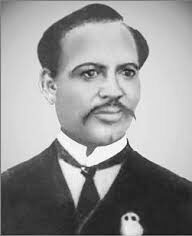
Lá pelo ano de 1890, a Italian Opera Company apresentava uma peça em Bombaim, onde nessa altura viera Lucasinho Ribeiro[iii], de Assagão. Este, mal que viu essa ópera, sentiu desabrochar em si a arte teatral. Por intermédio de um goês, arranjou forma de entrar nessa trupe, em que ficaria encarregado só de manobrar a cortina, pois outra coisa não sabia, sendo por isso até mal pago. Depois de ter viajado com essa equipa às cidades de Puna, Madrasta, Simla e Calcutá, demitiu-se quando a companhia estava prestes a viajar para a Birmânia.
Ora, Ribeiro voltou a Bombaim com as velhas roupas de veludo que adquirira a essa companhia teatral, tencionando apresentar uma ópera em concani. Travou conhecimento com Caetaninho Fernandes[iv], de Taleigão, e andaram os dois à procura de moços que se dispusessem a actuar no tiatr. Não encontraram, porém, qualquer interessado; ninguém se dispunha a subir ao palco, receando que o tiatr não passasse de mero zagor. Ribeiro ficou triste por não poder levar avante o seu plano, dadas as dificuldades.
Um dia, quando menos esperava, Caetaninho encontrou-se com João Agostinho Fernandes,[v] de Margão. Contou-lhe o seu plano a respeito do tiatr. Por sua vez, Agostinho visitou Ribeiro. Depois, os três visitaram os kudd[vi], onde contavam angariar jovens para o projecto do tiatr. A muito custo, acharam dois rapazes, um deles,[vii] Augustinho Mascarenhas, natural do bairro Mungul, de Margão.
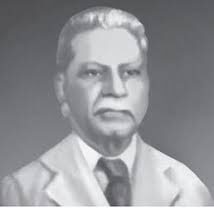
Ribeiro precisava de 9 artistas para a encenação da sua ópera; porém, eles eram só cinco. Decidindo então que cada um desempenharia dois papéis, puseram-se a ensaiar a peça todas as tardes. Em fevereiro de 1892, esses cinco jovens entusiastas, sob a direcção de Lucasinho Ribeiro, lançavam as bases do teatro em concani. Em 17 (?) de abril desse ano, no New Alfred Theatre, foi ao palco o primeiro tiatr, muito parecido com ópera, intitulado “Italian Bhurgo” (‘Moço Italiano’).[viii]
Dada a ligação íntima que a comunidade cristã de Goa tinha com os portugueses, estes tinham grande ascendente cultural sobre os goeses. Também se nota a influência da cultura ocidental sobre o teatro da língua concani. A maioria das cantaram (canções) do tiatr são baseadas em músicas ocidentais.
Em poucos anos, surgiram mais companhias teatrais na cidade de Bombaim, entre outras, The Goa Portuguese Dramatic Company; Ribeiro & D’Cruz Opera Co.; Lusitan; Dona Amélia; Dom Carlos; Douglas Comic Opera; Karschiwalla’s Delectable Co.; Goa Union; Lazarus Comic Opera; Goa National; Union Jack: todas elas muito populares.
O tiatr tradicional – seja ele de divertimento; social; religioso, ou outro– compõe-se de 7 partes, conhecidas como porde (cortinas). No começo do tiatr, e quando cai a cortina, são interpretadas três ou mais canções. Elas não têm relação alguma com o tema do tiatr; e, sejam solos, duetos, trios ou quartetos, têm o condão de fazer rir ou chorar, de corrigir as depravações sociais, apontando às falhas de corrupção ministerial e de astúcia política, e de repreender os maus. Em toda essa mescla, o tiatr tem graça e sobressai.
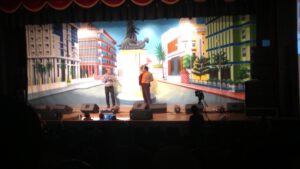
Dantes, o tiatr constava de 21 ou mais canções. Realizava-se à noite, e terminava na madrugada seguinte. Hoje, porém, tem havido muitas alterações. Está reduzido o número de cortinas e de canções.
Actualmente, é radiodifundida uma variante do tiatr que se chama khell-tiatr ou “non-stop show” (teatro popular, ora conhecido como “espectáculo ininterrupto”).
O tiatr, apesar de ter sido emanado do zagor, ocupa um lugar ímpar na Índia. É mais distinto do que o teatro em diversas línguas indianas. Não se assemelha a outros géneros dramáticos, ou seja, ao khell doxavtari ou o tamasha do Maharashtra; não é igual ao Bhovaia do Guzerate ou às canções populares do Karnataka; não se assemelha ao latra ou zatra da Bengala, ao Ramlila ou Roslila do Norte da Índia, ao nouttonki do Punjabe, ou ao kathakali do Kerala.
A maioria das peças teatrais não estão em letra de forma. Estão a rarear os seus manuscritos, sendo pouquíssimas as excepções. Estão impressos os dramas de João Agostinho Fernandes e de uns outros dramaturgos. De entre os nossos contemporâneos, artistas amadores como Tomazinho Cardoso, o padre Planton Faria, o padre Freddy J. da Costa e César D’Mello, têm vindo a publicar as suas peças teatrais.[ix]
Nos últimos 50 anos, foram encenados esses tiatr em Goa, em Bombaim e em outros lugares. Estão sempre cheios do tempero da sensação. No tiatr são tecidos o enredo, o diálogo, o entretenimento, o amor, a ira, o suspense e outros elementos.
Nos primeiros cem anos do teatro concani nasceram e morreram milhares de artistas de renome. Saíram da sua pena e foram levados ao palco inumeráveis tiatr que também merecem ser publicados. Caso contrário, esta nossa arte dramática entrará no ocaso.
-o-o-o-
[i] Tiatr é a forma tanto singular como plural desse substantivo em concani.
[ii] Zagor, teatro popular da comunidade hindu de Goa.
[iii] A certa altura, Constâncio Lucasinho Caridade Ribeiro (1863-1928) separou-se dos outros três, fundando a Ribeiro & D’Cruz Opera Company. Diz João Agostinho Fernandes, no seu artigo intitulado “Theatrancho Bhangaracho Jubileo”, publicado no Avé-Maria, semanário bombaense, em 25 de novembro de 1943, que foi Ribeiro o pioneiro da arte do tiatr.
[iv] Era empregado do bissemanário Bombay Gazette.
[v] João Agostinho Fernandes (1871-1947) foi empregado comercial e a sua (primeira) esposa, Regina, a primeira mulher goesa que subiu ao palco. Escreveu 27 peças teatrais em concani. Popularmente conhecido como ‘Pai Tiatrist’ (Pai dos Dramaturgos), foi baptisado com o seu nome e epíteto a sala de concertos Ravindra Bhavan, em Margão.
[vi] Kudd, aposento(s), que aqui se referem aos clubes, estabelecidos por associações goesas em Bombaim, e nos quais goeses de estratos mais humildes se aloja(va)m, transitoria ou demoradamente, quando em serviço nessa metrópole.
[vii] O quinto chamava-se Fransquinho Fernandes (Cf. John Gomes (Kokoy), Tiatr Palkhache Khambe, Goa: Queeny Productions and Publications, 2010, p. 5).
[viii] Sob a égide de The Goa Portuguese Dramatic Company, formada em 1892 (Cf. André Rafael Fernandes, When the Curtains Rise, Goa: Tiatr Academy of Goa/Goa 1556, p. 8)
[ix] No referido Tiatrancho Jhelo figuram os seguintes tiatrist (dramaturgos): no primeiro volume, C. Álvares (“Kedna udetolo to dis”, ‘Quando raiará esse dia?’); Remmie J. Colaço (“Atancho Temp”, ‘Os tempos actuais’); John Claro Fernandes (“23 Vorsam”, ’23 anos’); Prem Kumar (“Vauraddi”, ‘Operários’); e M. Boyer (“Ekuch Rosto”, ‘Única Via’); e no segundo, João Agostinho Fernandes (“Kunnbi Jaki”, ‘O curumbim Jaki’); José Pascoal Fernandes, vulgo J. P. Souzalin (“Sat Dukhi”, ‘Sete dores’); Aleixinho Fernandes, vulgo Aleixinho de Candolim (“Amchi xetachi panvddi”, ‘O leilão da nossa várzea’); A. Souza Ferrão (“Gouio Put”, ‘O filho maluco’); Caetano Manuel Pereira, vulgo Kim Boxer (“Somzonnent chuk zali”, ‘Um mal-entendido’). O terceiro e último volume, dedicado ao khell-tiatr, teatro popular, não chegou a ser publicado.
(Publicado na Revista da Casa de Goa, Série II, No. 22, maio-junho 2023)
“The Lord is my Shepherd”
In our somewhat directionless world, isn’t it reassuring to hear our inner voice say, “The Lord is my shepherd, there is nothing I shall want”? These verses from the David’s Psalm echo through the three Readings of today; not only were they said by Jesus in His own lifetime, Peter repeats them endlessly after the Resurrection.
After the Resurrection, it was important to catechise. We see once again, in the First Reading (Acts 2: 14, 36-41), how the first Apostle reproached people for putting Jesus to death and urged them to repent. The reward for their repentance would be to receive “the gift of the Holy Spirit”. The pardon of our sins, the gift of the Holy Spirit and the New Covenant are the fulfilment of messianic promises. They are open to anyone who accepts the Word of God and transforms their life. And what a privilege, as St Peter puts it, “The promise is to you and to your children and to all that are far off, every one whom the Lord our God calls to Him.”
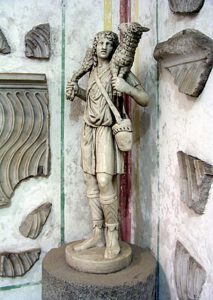
Again, in his First Letter, part of which forms the Second Reading of today (1 Pet 2: 20-25), St Peter conscientizes the people. He talks about how Jesus who is at once our Shepherd and Paschal Lamb. By His voluntary Sacrifice, He showed us the way from death to life eternal. St Peter therefore invites us to suffer, as Jesus did, in the midst of life’s difficulties, which include misunderstandings, calumnies, accusations and persecutions, all of which Christians suffer for being a stumbling block and rock of offence to the world.
Through it all, we learn from the Gospel (Jn 10: 1-10), we have nothing to worry, for Jesus the Good Shepherd is always by our side. He knows His Father in Heaven very intimately, and know us too with the same intimacy. He thus becomes “the door” to Heaven, the Mediator par excellence to our Father in Heaven. And His warning against false teachers and doctors – “thieves and robbers” all – is valid for all times, especially our own. He is the Way, the Truth and the Life; He is our only salvation. He is the door; anyone who enters by Him alone will be saved.
This Sunday, then, is rightly known as “Good Shepherd Sunday”. May we trust only Jesus to be our Shepherd through life; through Him alone can we have life, and life in abundance. Above all, may our Pope, our bishops and priests be good shepherds, taking the lay faithful always to the right pasture.
Mary to Mira: just a sound away?
The article titled ‘Milagris and Lairai: fostering the bond of divine unity’, by historian Dr Sushila Sawant Mendes (Herald, 23 April 2023)[1] has added to the myth rather than clarified it. One would expect to be enlightened on the origin of the statue of Our Lady of Miracles (also Milagr Saibinn, in Konkani), or the story of the Seven Sisters, or even be favoured with a sociological or anthropological explanation; but that was not to be. At any rate, as a lay reader, I wish to raise a few issues about its interface with Catholic practices in Goan society.
To start with, the loose use of the term ‘divine’ with reference to Our Lady leads to considerable confusion. Mary, the mother of Jesus, is not a goddess but a human being, whereas Lairai, shrouded in legend, is one of the seven sister goddesses to the Hindus. Why link a historical personage to a mythological septet? It is therefore gratuitous to put Lairai on a par with Milagr Saibinn.
Quite understandably, the article is riddled with expressions like ‘It is believed’ and ‘Legend has it’. But saying that “Milagris Saibin is believed to be the deity Mirabai, a sister of Goddess Lairai” begs the question: believed by whom? Is there a formal acceptance of the belief, or is it a belief held by an amorphous mass of individuals that offer flowers or pour oil on the statue? The latter practice is, perhaps, of recent origin and the only one of its kind in Goa.
From the Catholic perspective, the story is not Mariological. And stating that “There is a tradition to offer oil to the Milagris Saibin from the Shirigao Devasthan and mogra flowers are offered to Lairai Devi from the St Jerome Church in Mapusa” is not in keeping with any official Catholic tradition in Goa. So, the onus of showing the origin of such a protocol, if any, lies on our historian-writer.
That the purported institutional exchange is a no-no even from the Hindu side was confirmed by iconographer Dr Rohit R. Phalgaonkar, who has researched the issue.[2] No doubt, Mirabai was one of the seven sisters from folklore, but after her abode, Mapusa (not Mayem, as stated in the article), converted to the Catholic faith, way back in the sixteenth century, the temple authorities in Shirigao (and elsewhere) stopped mentioning Mirabai in the traditional invocations. In fact, “none of the sister temples make a reference to Milagris in their official records and in the religious duties or rituals that they perform at the festival. She is not an icon of the Hindus; she is a Christian icon," he added.[3]
Therefore, to say that Milagr Saibinn has taken the place of Mirabai is not plausible; and Dr Phalgaonkar wonders why Milagr Saibinn would have a link with Lairai alone and not with the other sisters! This only goes to prove that, if the issue is not handled with academic rigour, it can be grist to the myth-making mill even in our day and age.
Not surprisingly, there is a dash of magic realism, which helps bring the story alive: “… it is believed that the two sisters visited each other on the day of their respective festivals.” And risking repetition, the writer says, “Folklore tells us that Milagris Saibin would send flowers as a gift to her sister, Goddess Lairai, during the zatra. Lairai would send in turn oil for her sister’s feast.” That is to say, while earlier on in the article, the two institutions were given credit for the magical feat, now it is Milagr Saibinn and Lairai Devi themselves who show how they care for each other! Can scientific writing sacrifice accuracy at the altar of artistic licence?
With the theme of unity and a sense of disclosure ever present, the writer is keen to show that Goa is an oasis of intercommunal peace; and she bends over backwards to prove her point. That “every generation of the people of Assolna, Velim and Cuncolim have grown up with the belief that the Goddess Shantadurga of Fatorpa is the sister of Saude Saibin of the Church of Our Lady of Health in Cuncolim” is either an exaggeration or it speaks poorly of the catechesis received by the Catholics of those villages (AVC).
That is a facile generalisation, which, read alongside the sentences now in parentheses (“The festival of the Sontrios in Cuncolim and the devotional visits of the Catholics to this temple is a graphic representation of this undying belief. Tomorrow is both the feast of Milagres Saibin at Mapusa and the Shree Devi Lairai Zatra at Shirigao, both to be celebrated on the same day after thirteen years, on April 24 this year”) summarily puts Catholics across the length and breadth of Goa under the sontri or umbrella of a syncretic religion.
The article runs high on emotions. After referring to Lairai’s many sisters, the writer states: “Since all are still sisters, it is understood that people worship at either their temples or churches. It is an emotional explanation of how Goans are still one people with one culture even if, on the surface, they are divided.” Is the writer implying that Goans randomly visit places of worship – and does that effectively prove that they are “still one people with one culture”?
It is undeniable that the Indian Constitution allows freedom of religion and worship, but does that lead to licence? We get the impression that Goan Catholics and Hindus have no sense of belongingness and loyalty: they run with the hare and hunt with the hounds. Especially Catholics, followers of a monotheistic religion, to insinuate that they worship indiscriminately is a slur on their character.
We are catapulted into the next stage of mythification, on reading the story of Lairai fighting with her brother Khetko. When the writer says that “The ceremonies [at Shirigao] culminate when devotees walk through fire as acts of repentance by the two sisters who had mistreated their brother”, it is not clear which sister fought alongside Lairai and has been paying for it till date. Contextually, or say, in the writer’s variant of the myth, would it be a reference to Mary who has supposedly replaced Mirabai? The fact of the matter is that Mary had no brother and her world was one of meekness and peace.
Is it only a step from Mary to Mira? Or so it is made to appear – just a transposition of syllables! Whether or not “Goans worshipped the Mother Goddess in a number of forms even before the Portuguese arrived”, it is improper to say that “with the coming of the Portuguese, the Virgin Mary was introduced in her various versions”, for the Blessed Virgin Mary has no “versions” but only invocations and titles. Add to it the statement that the “Goans thus turned from one form of Mother Goddess to worship another”, and you have a gross oversimplification of the historical situation! And needless to say, to examine the claim that “many temples dedicated to the Mother Goddess were rebuilt as churches dedicated to Our Lady” would require a thorough historical approach.
To conclude: Considering that no society is devoid of myths, or even completely homogeneous in its myths, we can make allowances for the article’s ‘mythical reasoning’. India is a land abounding in myths and legends; we usually take them in our stride, considering that they have come down from a remote past over which we have no control.
Accordingly, living as we do in a secular democracy striving towards peaceful coexistence, the writer has ended up secularising the myth, of course, cherishing a well-founded hope for “a strong bond of unity”. But whereas this unity is desirable and even achievable at the social level, to endeavour to merge institutional identities, unite heterogeneous beliefs, and mix up religious doctrines is unacceptable.
Can we guard against processes leading to new myths? It is the bounden duty of academics to get to the bottom of it lest peace and unity become a myth.
Banner: https://gogoanow.com/milagres-feast-celebrated-st-jeromes-church/
[2] Cf. his lecture titled ‘Seven Sister Goddesses’ at https://www.youtube.com/watch?v=BDsQFx4jpII
[3] Interview with Dr Rohit R. Phalgaonkar, 28/29.4.2023.
The Challenge of Faith
Today’s Gospel, taken from St Luke (24: 13-35), is about what happened on the evening of the Resurrection and how the eyes of two disciples were kept from recognising Jesus who had just then joined them on the road to Emmaus. Jesus feigned ignorance of the things that had happened in those momentous days. Rather, He heard what they had thought of Him: that He was a prophet expected to redeem Israel, and now His body was reported missing.
Were they feeling it was all over now? Just then, the fellow traveller lamented their foolishness and how they were “slow of heart to believe all that the prophets have spoken.” But none of that hurt their self-esteem; they even invited the stranger to stay the night with them. And it was there at the table – when He took the bread and broke it – that their eyes saw Jesus; but he had meanwhile vanished out of sight.
What about us, traditional Catholics? We who have been with the Lord all these years, do we know Him up close and personal, or do we just take Him for granted? Do we recognise His presence in our midst, do we discern His signs; or does life go on as though He does not exist? Shouldn’t the Resurrection alone have vindicated Christ, strengthened our faith and fired us with zeal to let the world know that He alone is God? Historically, others who claimed to be prophets, or maybe even God, have died, and we have not seen even as much as a shadow of their former selves.
Moreover, the signs, prodigies or miracles that Jesus wrought during his public life and the marvels that we have been privileged to see down the ages are proof enough that the Church is divine. Jesus still walks the pilgrim path with us; He is with us on our road to Emmaus, a road fraught with difficulties and doubts. Jesus shares in our miseries and also brightens our path – a mystery we can discern only with eyes of faith.
St Peter, who is the focus of the first two readings, drives home the same point. He is all out to proclaim his Master, who, alas, he had thrice denied, but His rising from the dead has now clinched his faith. The First Reading (Acts 2: 14, 22-33) is a synopsis of Peter’s first testimony about Jesus to the eleven, after he received the gift of the Holy Spirit at Pentecost.
Here is Peter, transformed by the Resurrection! There is a spring in his step and new zeal in his voice. He feels emboldened to speak not only by what his ears had earlier heard, but by what his eyes have now seen: the Risen Lord! He conscientizes the people; he even indicts them for killing the Messiah. Needless to say, God who is always in control, had let it happen “according to the definite plan and foreknowledge of God” and now “God raised Him up, having loosed the pangs of death, because it was not possible for Him to be held by it.”
Peter also reminds the people that it had been prophesied by David that God would “not let the Holy One see corruption”. The first Apostle’s message speaks of everlasting life as prophesied by the sweet psalmist of Israel and as fulfilled in the Paschal mystery. He is proud and confident that this faith is not abstract but based on a real happening: the Resurrection. Nonetheless, as a final test of his faith, he who became the first Pope, ordained by Christ Himself, would die an inverted crucifixion in the gardens of Nero.
In the Second Reading (1 Pet 1: 17-21), we see the same Apostle: he had struck the High Priest’s servant Malchus with a sword in the Garden of Gethsemane, and now strikes while the iron is hot. Despite the tense and volatile situation in Jerusalem, Peter does not mince words when he speaks about his and our Lord and Master. His appeal to the faithful to conduct themselves “with fear” must to be understood as holy fear of God the Father, not of man. He stresses that Jesus is the Paschal Lamb who has sacrificed His life for the new humanity. “Through Him you have confidence in God, who raised Him from the dead and gave Him glory, so that your faith and hope are in God,” emphasises Peter.
Finally, we might wonder if a fisherman like Peter was ever capable of writing such profound exhortations. Most likely, his secretary, Sylvan or Silas, edited his letters, yet there is no denying that they are divinely inspired pieces of writing. Similarly, the fact that Our Lord chose poor Peter to lead the Church may baffle the worldly wise. But, then, God wants from us not our wisdom but our faith. A sure way of strengthening this is by becoming fools for Christ, and, like Peter, a rock upon which Christ can build His Church. Dare we accept the challenge of faith that the fisherman once accepted?
Banner: https://www.nationalgallery.org.uk/paintings/altobello-melone-the-road-to-emmaus
